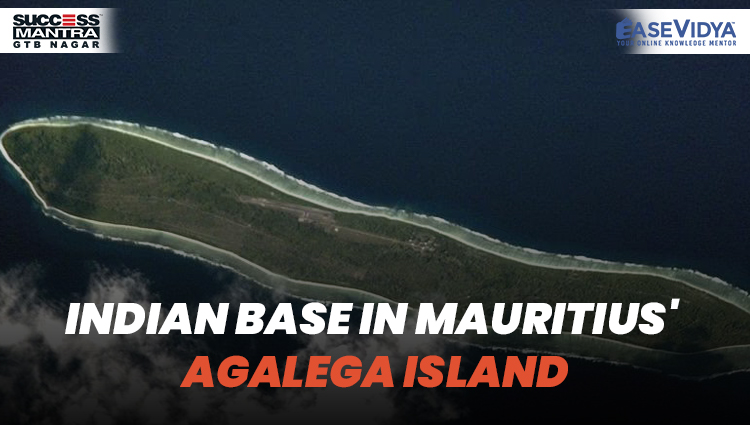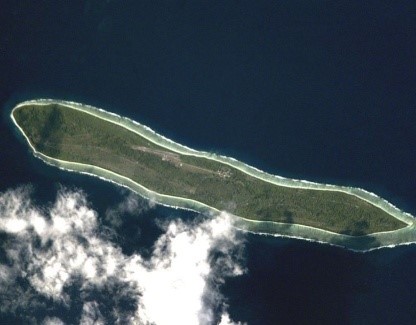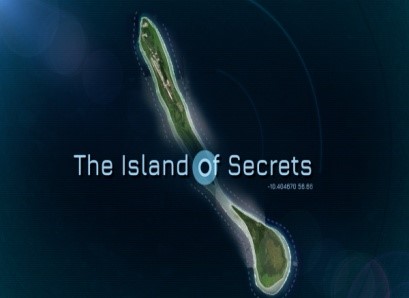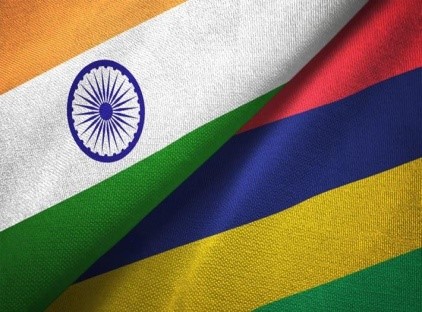
INDIAN BASE IN MAURITIUS AGALEGA ISLAND
INDIAN BASE IN MAURITIUS' AGALEGA ISLAND

Recently, Mauritius has denied a report that it has allowed India to build a military base on the remote island of Agalega. Earlier it was reported by a news broadcaster that an airstrip and two jetties to house an Indian military base on Agalega island is under construction.
Background: In 2015, India signed an agreement with Mauritius for development of Agalega Islands. It provided for setting up and upgradation of infrastructure for improving sea and air connectivity enhancing capabilities of the Mauritian Defence Forces in safeguarding their interests in the Outer Island. However, since then, there have been growing reports over the Indian naval and coastguard’s interests in setting up transponder systems and surveillance infrastructure, which has led to some local protests.
AGALEGA PROJECT
Agelega project includes the construction of a jetty, rebuilding, and extension of the runway, and building an airport terminal on Agalega Island. The USD 87 million projects are funded by India. The project would add a new airport, port and logistics and communication facilities and potentially any other facilities related to the project. The Agelega island is located in the southwestern Indian Ocean, 1,122 km north of Mauritius It has a total land area of 27 square miles (70 square km).
SIGNIFICANCE OF THE PROJECT
- Strengthen India's Presence: It will strengthen India's presence in the south-west Indian Ocean and facilitate its power launch aspirations in the region. India considers the new base necessary to facilitate both air and surface maritime patrols in the south-west Indian Ocean and as an intelligence post.
- Geo-Economic: As a “central geographic point” Mauritius holds importance for commerce and connectivity in the Indian Ocean. As a member of the African Union, Indian Ocean Rim Association and the Indian Ocean Commission, Mauritius is a stepping stone to multiple geographies. As a founding-member of the ‘Small Island Developing States’ (SIDS) it has been seen as a significant neighbour.
- Protect Foreign Trade: 95% of India’s trade by volume and 68% of trade by value comes via the Indian Ocean. Nearly 80% of India’s crude oil requirement is imported by sea via the Indian Ocean. So presence in the Indian Ocean is of significance for India.
- Countering China: To counter China’s ‘String of Pearls’ which can prove to be a threat to our strategic interests, it became extremely necessary for us to have a presence in the larger Indian Ocean Region.
- Security And Growth for All in Region: The project can be seen as a part of India’s efforts to contribute to its neighbor’s development stories under SAGAR (Security And Growth for All in Region). The project can be seen as a way to increase cooperation between India and its neighbors.
ASSOCIATED CHALLENGES

Protests from Opposition: Mauritius opposition has been raising concerns regarding transparency in the project. The Mauritian government has exempted the project from any Environmental license process (EIA clearances).
Protests from local People: In 1965, before Mauritian independence, the UK split the Chagos islands from Mauritius, forcibly relocating the inhabitants. Many Agalégans fear they could suffer a similar fate. All major military powers like France, China, US, and the UK have naval bases in the Indian Ocean this is leading to fears that their peaceful island region will also be militarised.
China Centric Policies: China's rapidly growing presence in the northern part of the Indian Ocean along with the deployment of Chinese submarines and ships in the region is a challenge for India.
Obsessive Security Policy: An obsessively security-driven policy of India towards its neighbours has not helped in the past. Certain common challenges like climate change, sustainable development and the blue economy should be reconsidered in India’s approach to Mauritius.
OTHER RECENT DEVELOPMENTS

In July 2021, Prime Ministers of India and Mauritius jointly inaugurated a Supreme Court building in Mauritius. In February 2021, the Union Cabinet approved signing of the Comprehensive Economic Cooperation and Partnership Agreement (CECPA) between India and Mauritius. India and Mauritius signed a USD 100 million Defence Line of Credit agreement. Mauritius would get a Dornier aircraft and an Advanced Light Helicopter Dhruv on lease which would build its maritime security capabilities. The two sides also discussed the Chagos Archipelago dispute, which was an issue of sovereignty and sustainable development before the United Nations (UN). In 2019, India voted at the UN General Assembly in support of the Mauritian position on the issue. India was one of the 116 countries that voted demanding that the UK end its “colonial administration” from the group of islands. India delivered 1,00,000 Covishield vaccines to Mauritius.
CONCLUSION
Unlike the military bases run by other countries, the Indian bases are the soft base which means locals can move through any Indian-made project. So the local governments get more control over their domain, without diluting their sovereignty. India needs to project itself as a credible and long-term partner in a more persuasive manner by allaying the fears of all parties affected. Companies registered in Mauritius are the largest source of Foreign Direct Investment (FDI) into India, making it crucial for India to upgrade its bilateral tax treaty, adopting the latest international practices that prevent multinational companies from artificially shifting profits to low tax countries. As India takes an integrated view of its security cooperation in the south western Indian Ocean, Mauritius is the natural node for it. Therefore, it is important to take course-corrections in India’s Neighbourhood First policy.












0 Comment